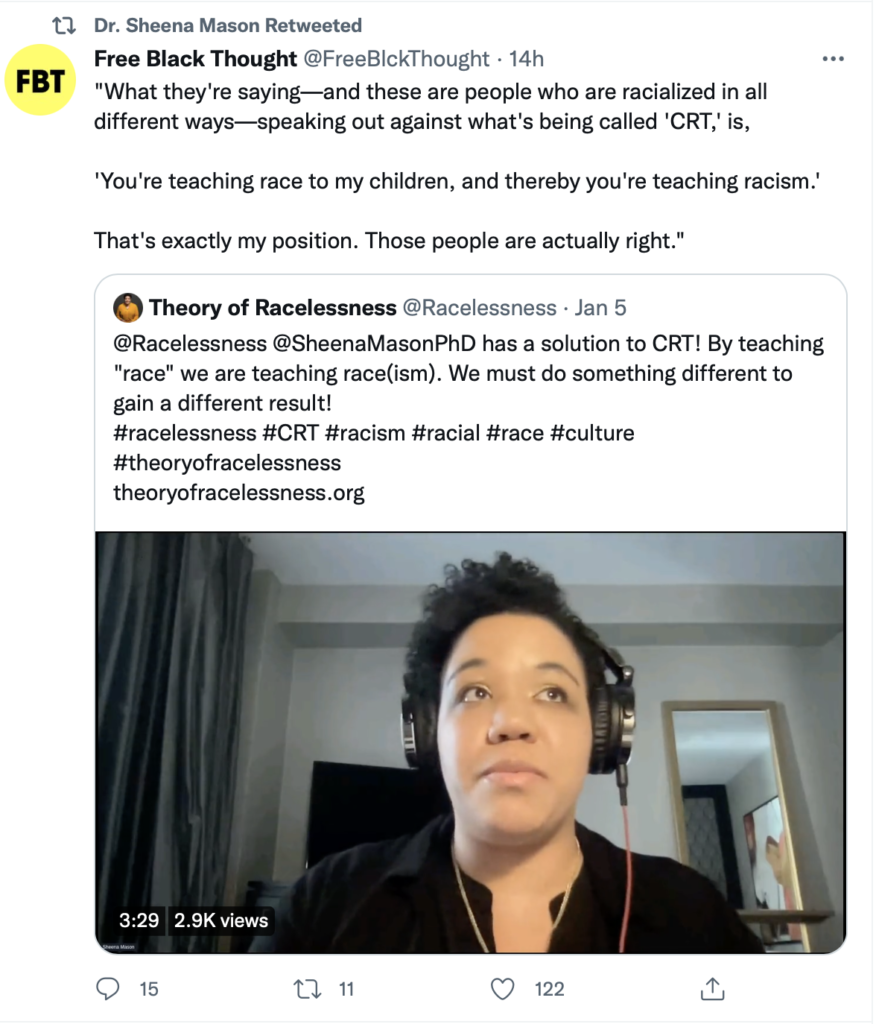In the Journal of Free Black Thought, Professor Sheena Mason argues that the only way to do away with racism is to do away with the concept of race. Here’s an excerpt:
Theory of Racelessness, in contrast to traditional antiracism, operates from a metaphysically skeptical and normatively eliminativist position. Thus, it constitutes a true antirace(ism) by seeking to undo not only racism but also “race.” It holds that “race” does not exist except insofar as it is imagined to exist, and that, therefore, the sooner we stop imagining it in our language and discourse, the sooner it will vanish. In eliminating “race,” the Theory of Racelessness helps people recognize and imagine themselves outside of race(ism). It enables people to see themselves and others more clearly, without the distorting filter of “race.” In this way, the theory also helps people become more astute at recognizing and solving race(ism). Importantly, the theory’s core is bringing our shared humanity to the forefront in ways that the divisive presence or insertion of “race” ideology precludes. Together, we can do anything, including uphold race(ism). But we can also reconcile, heal, resolve, and eliminate the problem, too.
Mason’s Biography includes the following:
Sheena Mason is assistant professor of English at SUNY Oneonta. Her forthcoming book, Decolonizing the Raci(al/st) Imagination in Literary Studies: An Interrogation and Critique of Antiracist Discourse (Palgrave Macmillan, 2022), presents a skeptical eliminativist philosophy of race and racism that results in her signature “theory of racelessness.” The book argues that African-American writers across time have created art that resists racism through their resistance to and rejection of race. Theory of Racelessness is Prof. Mason’s educational consulting business. With the rise of antiracist discourse and initiatives, many organizations unintentionally promote racist ideas and miss opportunities to identify and celebrate genuine diversity of thought over perceived variety, based mainly on phenotype and social constructions (i.e., concepts of race).
I like this approach. I have often expressed the idea that our approach to “racism” should be twofold. “Race” itself is a destructive idea, an often well-intended miscategorization of people that assumes that people can be accurately judged (as to things like character, intelligence, education, moral character) by their looks.This means that the concept of “race” has no more validity than astrology. You cannot judge anyone’s character by immutable characteristics like phenotype or birthdate. Skin doesn’t think. On the other hand, many people we need to vigorously fight those who do want to judge others by immutable characteristics. We need to vigorously confront these people in the public square. Whenever someone is harmed by others’ willingness to engage in racecraft, we need to be especially vocal, resorting to the court system to oppose any discrimination based on “race.” We need to ostracize anyone disparaging anyone else based on looks, even if done with allegedly good intentions.
As Sam Harris has suggested, we should be working toward a world where “race” is the least interesting thing about another person.



This is a highlight from a longer conversation between Dr. Sheena Mason and Rev. Starlette Thomas.